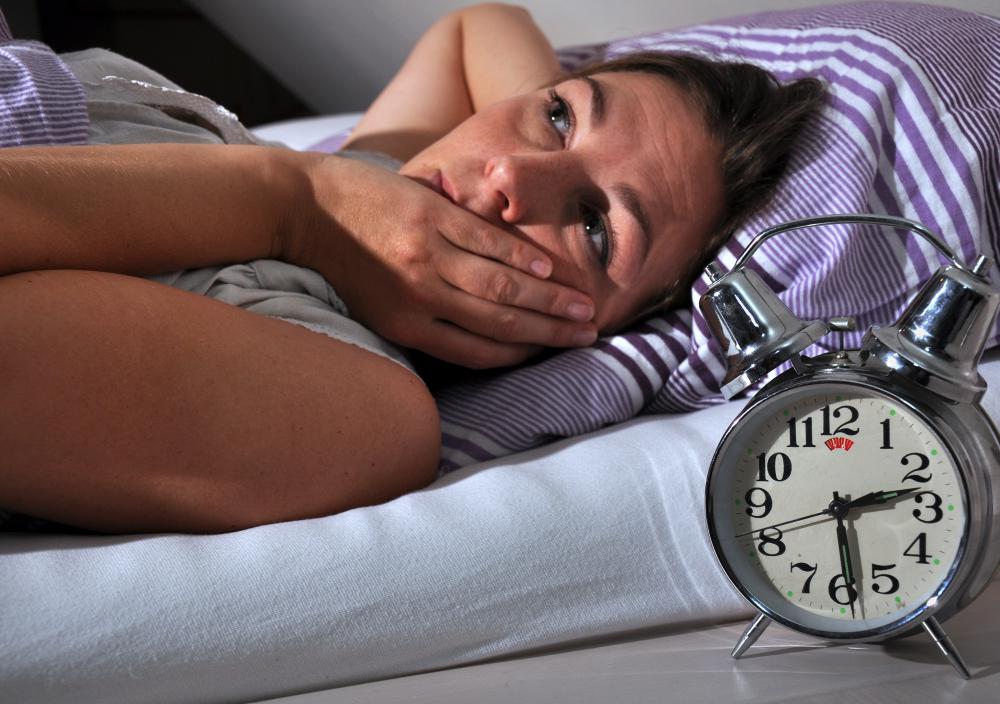At WiseGEEK, we're committed to delivering accurate, trustworthy information. Our expert-authored content is rigorously fact-checked and sourced from credible authorities. Discover how we uphold the highest standards in providing you with reliable knowledge.
Does Sleep Deprivation Lead to Weight Gain?
Scientific studies at institutions such as the University of Chicago have demonstrated that there is a clear link between sleep deprivation and weight gain. Getting less sleep on a regular basis may result in gaining weight, especially for people who do not have carefully disciplined diets. Figuring out the level of sleep that is right for an individual can be challenging, but it is important. Getting the proper amount of sleep may have other physical and mental health impacts.
The correlation drawn between sleep and weight relationships suggested that more studies needed to be done. Several observers noted that in the 1960s, Americans started sleeping much less than they had before. At the same time, overall weight averages started to climb. Many things could have been responsible for this link, but evidence suggested that sleep deprivation could be an important factor. It took careful study in sleep laboratories to uncover the fact that sleep deprivation can lead to weight gain.

People who sleep less appear to generate more ghrelin, a hormone which stimulates hunger. Research subjects reported an increased craving for food, especially fats and starchy foods, after simulated sleep deprivation. The subjects were only allowed to sleep for four hours before being offered breakfast in this study. At the same time, levels of leptin, a hormone which tells the body it is sated, decreased. This meant that the research subjects not only were more hungry after sleep deprivation, but could also potentially eat more.

Subjects who were allowed to sleep for up to 10 hours had normal levels of these hormones in the body, indicating that the increased period of sleep was beneficial. Other studies of the link between sleep deprivation and weight gain have supported the conclusion that people who sleep less are more likely to be overweight. This explains why parents struggling with a new baby, college students balancing a difficult work load, and night shift workers often experience weight gain. Sleep deprivation is also believed to be generally unhealthy, especially for people who are already experiencing stress.

Many people experience sleep deprivation because they do not budget their time well, or they do not realize how much sleep they really need. Vacation is an excellent time to determine how much sleep your body naturally needs. Sleep as much as you like at the beginning of a vacation, allowing your body to catch up on lost sleep. After the first few days, you will find that your sleep normalizes at around eight hours or so a night. Take note of many hours of sleep you need to feel refreshed, and try to sleep that much during your working life as well. Although it may be difficult at first, the increased sleep will positively impact your working ability, health, and happiness.
AS FEATURED ON:
AS FEATURED ON:















Discussion Comments
I haven't been sleeping a lot my first year of college and I've gained 20 pounds, but I don't know where it is all from. I've gained muscle from weight training also but I still don't understand where the 20 pounds of whatever is. Is it stored as fat?
This does not explain all the people, including Osmosis (above post)and myself, who are not eating more as a result. In fact, I do not find that my appetite is greater and I do not eat more.
Unless there is a mechanism related directly to metabolic rate. If the metabolic rate decreases with less sleep -- that could account for the weight gain.
Interesting! I have found this to be true. Although I don't feel like I'm eating more, I'm definitely gaining weight, and I was wondering if it was attributable to stress. I'm not sure how that would work, but I know I need eight to nine hours of sleep and when I'm stressed I can't fall asleep and when I do sleep, I don't sleep well.
So should someone start a sleep to lose weight diet plan? Not a bad idea!
It certainly does. Too little sleep disrupts the levels of hormones that control appetite. So we get caught up in a vicious cycle, we eat too much, sleep too little and feel tired and stressed, so we eat some more. Most people need 7 to 8 hours of sleep a night.
Post your comments